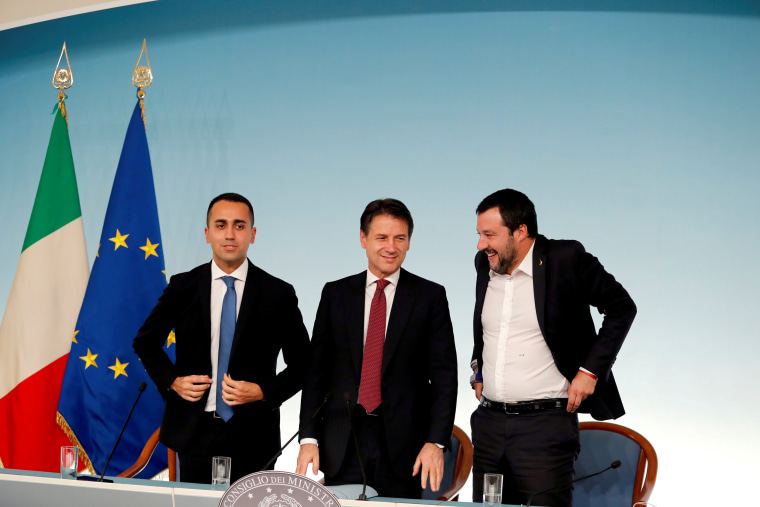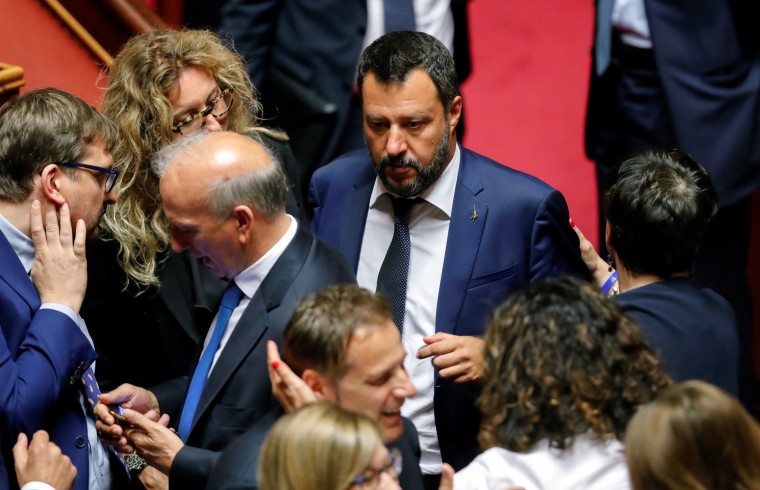ROME — Italy's hard-line populist interior minister has brought his government to the brink of collapse by calling for an early election that could see the country lurch toward the far-right.
Matteo Salvini is leader of the League, a staunchly anti-immigration party that currently governs in coalition with the anti-establishment 5-Star Movement. Salvini is also one of Italy's two deputy prime ministers, alongside 5SM leader Luigi Di Maio.
Though the M5S began as the senior partner, the League has recently been climbing in opinion polls, edging toward the 40 percent of public support it would need to govern alone.
Even if he fell short of this electoral threshold, Salvini could go into government with the Brothers of Italy, a far-right nationalist party.
Its leader, Giorgia Meloni, said an early election could produce a government willing to make "politically incorrect reforms that Italy needs," The Associated Press reported.
Were Salvini to win an early election, "it would make it one of the most right-wing governments in Europe," according to Lorenzo Castellani, a politics professor at Rome's Luiss University.
Europe has seen a shift toward that extreme in recent years, with far-right, anti-immigration and anti-Islam parties breaking into the political mainstream in France, Germany, the United Kingdom and beyond.
In Hungary, Prime Minister Viktor Orban championed what he calls his "illiberal democracy," eroding democratic institutions and deploying anti-Semitic rhetoric, according to his critics.
Until recently, the Austrian government was propped up by a far-right party, the Freedom Party of Austria, which was founded in the 1950s by former Nazis.
Some of these parties have alleged links with Russian President Vladimir Putin, who squarely aligned himself with their worldview when he declared in June that liberalism was "obsolete." Last month, Salvini himself denied that his party sought millions in Kremlin funding through a secret oil deal.
Salvini has pledged to deport half a million people and has barred entry to ships carrying refugees.
He was criticized earlier this year after skipping celebrations marking Italy's 1945 liberation from the fascist rule of Benito Mussolini, who spent the last two years of World War II overseeing a puppet republic in Nazi-occupied northern Italy.
Salvini's and Di Maio's parties have been something of an odd couple since they joined forces after an election in May 2018. They have been bickering for months over several domestic policy issues, including disagreements over taxes and a high-speed rail link to France.

Salvini has styled himself as a man-of-the-people who for most of the summer has decamped to the beach. He began the coalition last year with a little more than half the public support of the M5S. But these roles have since flipped, with the League topping Italy's polls in May's European Parliament elections, and today scoring as high as 38 percent in opinion polls.
On Thursday the party said the disagreements with its bedfellow had become too much.
"We have to acknowledge that, after having accomplished many good things, for too long now the League and the 5-Star movement have disagreed on fundamental issues," the League said in a statement.
"Italy needs certainties and courageous choices," it added. "Every day that passes is a day lost. To us, the only alternative to this government is to call for new elections and let Italians decide."
Although Salvini's intervention appears to make the current government unworkable, an early election is not certain. Italy's parliament is currently on its summer recess and has not held a vote in the fall since the end of World War II, according to Reuters.
Prime Minister Giuseppe Conte, a law professor who belongs to neither party, said on television that Salvini must explain to Italians why he wanted to bring down the government and condemned "the crisis he has unleashed," Reuters reported.
The prime minister could call a "motion of confidence" in the government, and will resign if he loses. But the president, Sergio Mattarella, is the only person with the power to dissolve parliament.
Instead he may opt to install a government of technocrats — apolitical experts, rather than tribal politicians — so the 2020 budget can be passed and any election can be postponed until next year.
Italy is the world's eighth largest economy but has Europe's second largest sovereign debt burden after Greece. It has already angered the European Union by threatening to break its budget rules, and Salvini is already setting up another clash next year by seeking major tax cuts.
Catherine Fieschi, an expert on populism and director of the British think tank Counterpoint, believes that if Salvini gains power he might switch focus from immigration to the economy in a bid to be taken more seriously than the other populist firebrands with whom he is currently associated.
"His ambition has been driven by a real sense that Italy has been humiliated in Europe," she said. "Putting Italy back at the heart of Europe is important to him, and he knows he can't do that by being a troublemaker all his life."
Claudio Lavanga reported from Rome, and Alexander Smith reported from London.



